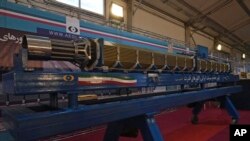Iran on Monday denied reports that it is enriching uranium to near weapons grade.
"So far, we have not made any attempt to enrich above 60%. The presence of particles above 60% enrichment does not mean production with an enrichment above 60%," the spokesperson for Iran's Atomic Energy Organization, Behrouz Kamalvandi, said on Monday, according to the official IRNA News agency.
A Bloomberg News report Sunday said inspectors from the International Atomic Energy Agency had detected uranium enriched to 84%.
Uranium must be enriched to about 90% for a nuclear bomb.
U.S. Secretary of State Antony Blinken told reporters Monday during a visit to Turkey that the United States was in close contact with the IAEA and working to get more information about the situation.
“This would be a very serious matter,” Blinken said.
The IAEA said in a tweet Sunday that it was aware of the reports regarding Iran’s enrichment levels.
“Director General Rafael Grossi states that the IAEA is discussing with Iran the results of recent Agency verification activities and will inform the IAEA Board of Governors as appropriate.”
Allegations that Iran was working to create nuclear weapons led to the 2015 Joint Comprehensive Plan of Action that limited Iran’s nuclear program in exchange for sanctions relief. Under that deal, Iran could enrich uranium only to 20% and could hold only limited stockpiles of enriched Uranium.
After the United States withdrew from the agreement in 2018 with then-President Donald Trump arguing Iran got too much while giving up too little, Iran began stepping away from its commitments under the JCPOA. That has included both boosting its enrichment levels and stockpiles, as well as employing more advanced centrifuges used in the enrichment process.
Some information for this story came from Agence France-Presse and Reuters.






